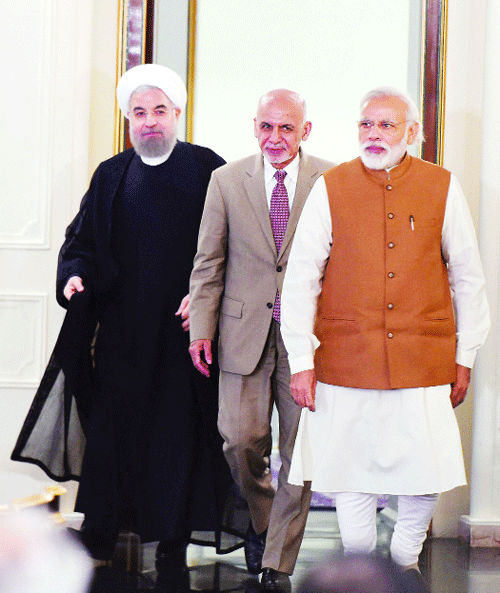The Chabahar port will help New Delhi improve its relationship with Tehran and give India access to Central Asian markets where it is competing with China. Additionally, it may also help better ties with Pakistan
Uneasy and hostile relations with Pakistan have constrained India’s ability to develop closer economic and political ties with Central Asia. When the Soviet Union collapsed in 1991, the five republics in Central Asia, namely Kazakhstan, the Kyrgyz Republic, Tajikistan, Turkmenistan and Uzbekistan were in a state of significant disorder. These were the states which were totally ill-prepared for nationhood after having been absorbed by the Russian empire in the 18th and the 19th century. They were then in need of substantial knowledge and expertise on governance issues and development policies.
However, India’s response to this need was slow and inadequate not only because of the physical and political barriers that existed with a hostile Pakistan and a troubled war-torn Afghanistan, but also because historically, India has seldom seriously engaged with societies across the Himalayan range. Yet, it is now, more than ever before, in India’s interest to develop closer economic, cultural and political ties with that region. After all, as the crow flies these countries are as close to New Delhi, for instance, Hyderabad in some cases and Bangalore in other cases.
It is in this context that the prospect of the early completion of the Chabahar port, as an outcome of Prime Minister Narendra Modi’s visit to Iran, holds great significance. While this port gives India access to the Central Asian Republics (CARs) by-passing Pakistan, if this opportunity is seen in its wider sense, it can actually help improve relations with Pakistan as well. It certainly holds the potential for a substantial improvement in the relationship with Iran, which has not been without some strain during the past few years when Iran was placed under sanctions on account of its nuclear activities.
However, the mere construction of the port and the provision of various facilities will not assure success of this venture. For the port to function in an economically viable manner, in a business sense, it will have to generate enough business through trade with the CARs and other countries and trade as well as development assistance activities with Afghanistan. For India and Iran, Chabahar presents a win-win opportunity for coordinated actions in areas of mutual interest. While the benefits for India are evident, in the case of Iran, there is both economic as well as political dimension which is attractive. First, trade between India and eastern Iran is likely to grow and more importantly, the two countries can work together for an all-round development and peace in Afghanistan. Any disturbance in Afghanistan has direct spillover impacts on Iran. In the past India and Iran cooperated in supporting the Northern Alliance in Afghanistan, and both countries see the Taliban as a threat for the elimination of which they will be able to work far more effectively together once the Chabahar link is established.
The major benefit of Chabahar, however, is in the easier access that it will provide for India to develop much stronger ties with the CARs. But this will not happen without major efforts on part of the Government of India and other stakeholders in the country. On May 25 and May 26 this year, Kazakhstan held the annual Astana Economic Forum, which drew leaders from politics and business from all over the world, but India was conspicuous by its absence. India has some outstanding leaders of business, but there was not one from among them present at that event.
In contrast, Jack Ma, the founder and chairman of Alibaba Group from China had a prominent role on the agenda of the forum, speaking in the same session as Kazakhstan President Nursultan Nazarbayev.
Kazakhstan is undertaking ambitious transformation of its economy in response to the fall in global prices of oil and other commodities, which in the past provided substantial revenues to fuel rapid growth of its economy. This is a nation which has a small population but a vast area of land. India can play an important role to help improve Kazakhstan’s agriculture, harness its substantial renewable energy resources and expand its industrial base to add value to the large amount of mineral and other resources that the country possesses.
The CARs are also an important component of China’s efforts to revive the old Silk Route and extend its trade and sphere of influence. Of all these nations, Kazakhstan has registered the most impressive growth in economy, and China has already emerged as an important trading partner. It has developed access into the oil, natural gas, minerals and other important sectors of the Kazakh economy. Yet, there is a certain uneasiness about China’s role and proximity and related concerns, which prominent persons in that country have expressed quite freely.
China has created the Shanghai Cooperation Organisation (SCO), which includes apart from China and Russia, all the five CARs. President Nazarbayev in his speech at the AEF, stated, “Today, we are facing the creation of the Asia-Pacific bloc with the United States, we hear about the talks on the upcoming negotiations and agreements of Europe-America. We are creating the SCO in the Central Asian and Eurasian region. At the meeting, in June, we will probably consider the question on the admission of India and Pakistan and possibly Iran to the organisation. The population of the SCO will total three billion.” If this grouping were to expand as proposed, then Chabahar will provide India access to this large group of countries including western Pakistan.
Against this background, it is important for India to develop a clear road map and plan of action which also includes trade with Pakistan through the port at Chabahar. This will also be an appropriate occasion for serious reappraisal and implementation of the Iran- Pakistan-India natural gas pipeline which was first proposed by this writer in 1989 along with Ali Shams Ardekani of Iran, who later became that country’s Deputy Foreign Minister.
It will be a limiting view to treat Chabahar as only a means to by-pass Pakistan for gaining access to Central Asia. This specific development has to be evaluated in its entirety to fully estimate the economic and political payoff it can generate for the entire region. In doing so it will become evident that India and Iran will not be the only party to benefit from this project. That will then provide a basis for taking all the steps that will be a prerequisite to ensure that the benefits envisaged are actually achieved, and the capacity of the port utilised fully for the benefit of the region as a whole. In some sense Chabahar can be a game changer for South Asia, Central Asia, Iran and even China, if each party sees stakes for itself in this particular project.
(The writer is former chairman, TERI)
























